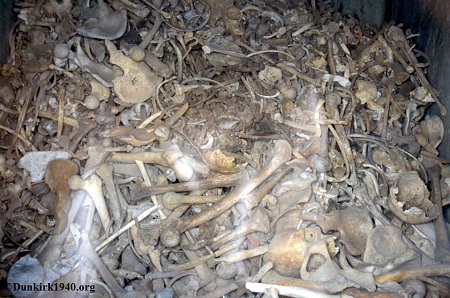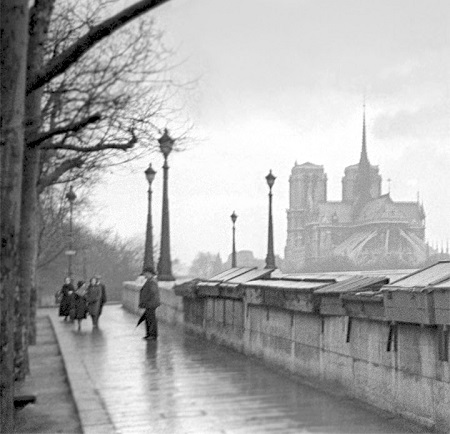
The bones of the fallen beneath L'ossuaire de Douaumont at Verdun. Here lies the bones of both French and German soldiers who were unable to be identified follow the battle.
Victory in 1918 came at a huge cost for France both in terms of manpower and its economic impact. France had lost 1.4 million dead, with four times that number wounded. The industrial heartland of northern France had been ravaged by the war and France was forced to borrow billions of dollars from the U.S. to rebuild its shattered economy. However, the Treaty of Versailles was favourable to France. The principal outcomes from a French perspective were the return of the departments of Alsace and Lorraine to France and that Germany was required to pay war reparations to France to cover the cost of the war.

Anti-Communist window stickers.
Economic growth in the 1920s was rapid and by 1924, industrial and agricultural production had recovered to pre-war levels. However, there were problems in obtaining the war reparation payments from Germany and in 1923, French and Belgian troops occupied the Ruhr valley to force the Germans to meet their obligations. Such aggressive actions were largely unsuccessful and created a rift between France and its former British and American allies. Eventually, the nations agreed to re-schedule reparation payments. However, by 1931, Germany was virtually bankrupt and all payments were suspended. By this point, France was experiencing its own economic woes. Falling economic output, rising unemployment and political unrest eventually led to major riots in February, 1934.
The inter-war years saw the polarisation of politics in France with the rise of the French Communist Party and at the other extreme, a proliferation of far-right nationalist parties. During the mid 1930s, the Communist party formed an alliance with other socialist parties and formed the so-called Popular Front which won the 1936 election. Such success was short-lived as controversies around the economy and inaction in relation to the Spanish Civil War resulted in the collapse of the alliance and the government.
In terms of national defence and foreign policy, French thinking was entirely defensive. To protect its border with Germany, France established a "state of the art" but costly defence line known as the Maginot Line. Just as in Britain, the horrors of the First World War and the reality of a resurgent Germany led to a policy of appeasement to German expansionism. In any event, the political instability, which featured throughout the 1930s, meant that France was incapable of providing effective opposition as an increasingly extremist Germany re-occupied the Rhineland, annexed Austria and eventually invaded Czechoslovakia.
